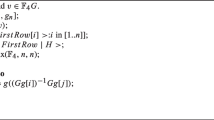Abstract
Each binary linear code can be associated to a binomial ideal which allows for a complete decoding. Two generalizations of the non-binary case given by the ordinary and generalized code ideals have been given which coincide in the binary case and are related by elimination. The approach based on the generalized code ideal provides complete decoding but can be rather cumbersome. In this paper, a new heuristic decoding method based on the ordinary code ideal will be given which can be much faster.
Similar content being viewed by others
References
Adams W., Loustaunau P.: An Introduction to Gröbner Bases. American Mathematical Society, Providence (1994).
Aliasgari M., Panario D., Sadeghi M.R.: Gröbner bases for lattices and an algebraic decoding algorithm. IEEE Trans. Commun. 61(4), 1222–1230 (2013).
Becker T., Weispfenning V.: Gröbner Bases: A Computational Approach to Commutative Algebra. Springer, New York (1998).
Borges-Quintana M., Borges-Trenard M., Martinez-Moro E.: On a Gröbner bases structure associated to linear codes. J. Discret. Math. Sci. Cryptogr. 10(2), 151–191 (2007).
Borges-Quintana M., Borges-Trenard M., Fitzpatrick P., Martinez-Moro E.: Gröbner bases and combinatorics for binary codes. AAECC 19(5), 393–411 (2008).
Cox D., Little J., O’Shea D.: Ideals, Varieties, and Algorithms. Springer, New York (1996).
Dück N., Zimmermann K.H.: Graver Bases and Universal Gröbner Bases for Linear Codes. Int. J. Pure Appl. Math. (2014, to appear).
Faugere J., Gianni P., Lazard D., Mora T.: Efficient computation of zero-dimensional Gröbner bases by change of ordering. J. Symb. Comput. 16, 329–344 (1993).
Huffmann W., Pless V.: Fundamentals of Error-Correcting Codes. Cambridge University Press, Cambridge (2003).
Leppert R., Saleemi M., Zimmermann K.H.: Gröbner bases for quaternary codes. J. Pure Appl. Math. 71, 595–608 (2011).
MacWilliams F., Sloane N.: The Theory of Error-Correcting Codes. North Holland, New York (1977).
Marquez-Corbella I.: Combinatorial commutative algebra approach to complete decoding. Ph.D. thesis, Institute of Mathematics, University of Valladolid (2013).
Marquez-Corbella I., Martinez-Moro E.: Algebraic structure of the minimal support codewords set of some linear codes. Adv. Math. Commun. 5, 233–244 (2011).
Marquez-Corbella I., Martinez-Moro E., Suarez-Canedo E.: On the ideal associated to a linear code. Adv. Math. Commun. 5(2), 233–244 (2012).
Saleemi M., Zimmermann K.H.: Gröbner bases for linear codes. Int. J. Pure Appl. Math. 62, 481–491 (2010).
Saleemi M., Zimmermann K.H.: Linear codes as binomial ideals. Int. J. Pure Appl. Math. 61, 147–156 (2010).
Saleemi M., Zimmermann K.H.: Gröbner bases for linear codes over GF(4). Int. J. Pure Appl. Math. 73(4), 435–442 (2011).
van Lint J.: Introduction to Coding Theory. Springer, Berlin (1999).
Author information
Authors and Affiliations
Corresponding author
Additional information
This is one of several papers published in Designs, Codes and Cryptography comprising the “Special Issue on Computer Algebra in Coding Theory and Cryptography”.
Rights and permissions
About this article
Cite this article
Dück, N., Zimmermann, KH. Heuristic decoding of linear codes using commutative algebra. Des. Codes Cryptogr. 76, 23–35 (2015). https://doi.org/10.1007/s10623-014-0008-8
Received:
Revised:
Accepted:
Published:
Issue Date:
DOI: https://doi.org/10.1007/s10623-014-0008-8



